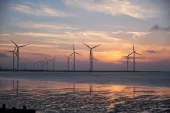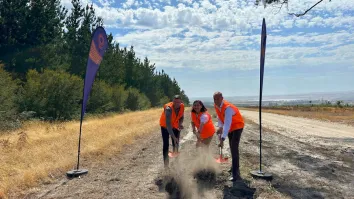
Nuclear energy to grab only 4.7% of Japan's total generation by 2026
No thanks to strong public opposition to nuclear restarts.
Public opposition to the restart of a series of nuclear reactors will weigh on the potential of a nuclear rebound in Japan, according to BMI Research, meaning that the country will continue to rely on imported fossil fuels to plug the gap from nuclear over its 10-year forecast period.
"We expect widespread public opposition to nuclear restarts to weigh on a pronounced nuclear power rebound in Japan over the coming decade, and we only expect nuclear to contribute 4.7% to total power generation by 2026," BMI Research said.
Concerns over the safety of currently idled facilities that have applied to restart have already culminated in a string of court injunctions and wavering support from prefecture governors.
Here's more from BMI Research:
We believe this makes the restart of these facilities in a timely manner highly uncertain.
The reliance on imported fossil fuel feedstock for power generation will therefore remain elevated in Japan as the country plugs power mix gaps left from idled nuclear facilities.
Prime Minister Shinzo Abe remains committed to the restart of nuclear power generation after all 42 nuclear reactors went offline in the aftermath of the Fukushima disaster in 2011.
This view is evidenced by the Japanese government's push to source 20-22% of total power generation by 2030. The commitment to nuclear power stems from the desire to lower Japan's fuel feedstock import bill (which has spiked as the country imports more coal and liquefied natural gas (LNG) to make up for the nuclear shortfall), lower the cost of retail electricity to support households and businesses, and support hard-hit utilities.
In our previous forecast, this robust government support informed our view that multiple reactors would come online over the next decade, with momentum increasing in the early 2020s).
However, intensified opposition to restarts at the localised level has now prompted us to lower our expectations, particularly as the courts and prefecture governors are increasingly siding with local communities.
We note that the less supportive stance from prefecture governors is a shift from their traditionally robust support for utilities prior to the Fukushima disaster, a shift that reflects the anti-nuclear sentiment across Japan.
For example, a series of prefecture governors are not officially supporting nuclear restarts, and are even awaiting clearances from the Nuclear Regulation Authority before taking a stance. Even in the case of reactor clearance, the widespread opposition at the grass root level will make support at the prefecture level highly contentious, weighing on restart plans.
While prefecture governors do not have the legal authority to reject restarts, their agreement is traditionally sought after for a plant to resume operations. The table below highlights that a majority of nuclear reactors with an active restart application are facing local opposition, wavering prefecture-level support and court injunctions. As such, the current uncertainty over support for a number of reactors means that we are cautious to include more than 10 of the 25 reactors that to date have applied to return online into our 10-year forecast up to 2026.



















 Advertise
Advertise







